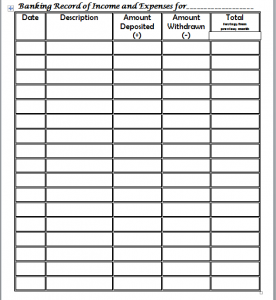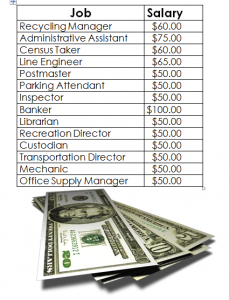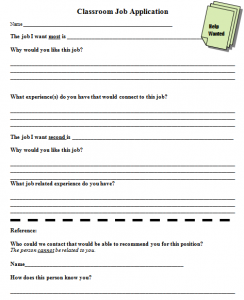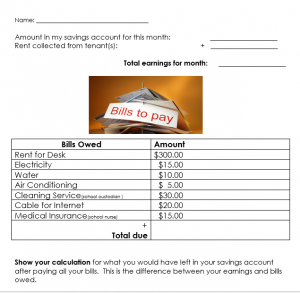Purpose of a Classroom Economy System:
To reinforce, encourage and account for responsible work habits.
To practice saving, managing and making decisions about money.
 Students will:
Students will:
- Manage a money record
- Be employed with jobs & wages.
- Pay monthly bills for utilities & services.
- Pay monthly rent for desk.
- Save for Property “desk” Ownership.
- Deposit money into a savings account.
- Have opportunities for buying privileges.
- Learn about loans and taxes.
Job Listing |
Job Application |
The classroom economy is based on the idea of connecting a life skill, money management, to the management of a classroom. It is based on an idea gleaned from Teach Like Your Hair is On Fire by Rafe Esquith. It is a real-world interactive experience for teaching and reinforcing responsible, respectful and safe citizenship habits. It is used in lieu of a prize box, party/movie privilege or other type of reward incentive system used for classroom management.
- Students earn money weekly for their classroom jobs.
- Each day starts with $20 in a bonus cup. A dollar is pulled out with a quick verbal “k-ching” when there is an interruption, transition issue, or one of the five things of listening is not followed (no names are used). At the end of the day the class deposits into their savings what is left in the cup. Dollars can be put back in the cup throughout the day when the community gets back on-track with expectations or has made something work well for the community.
- Students deposit money for a “Bravo” Friday Update (no money is lost if not achieved).
- Weekend Home Reading sheets turned in are above and beyond, so are worth bonus pay.
- 10 punches in a Choice Challenge card can earn bonus money.
- Students transfer points and wins earned during classroom games into money for their savings accounts.
- At the end of 4-weeks a bill of expenses for the month will be issued.
- After paying bills students can buy privileges, like lunch with friends. Or students can “bank” their money for the new month to save up for investments, like property (desks).
- Students will also pay taxes for property and income to teach how government services are paid for which connects to our social studies learning.
- The system involves calculating money & working with decimals to connect with math.
- The focus is on earning, saving and managing money.
Throughout the years this classroom management system has evolved with student and parent support to become a positive way to immerse kids in experiential learning.



